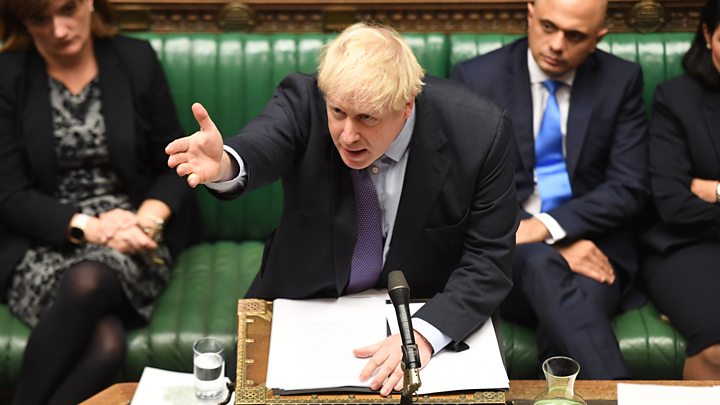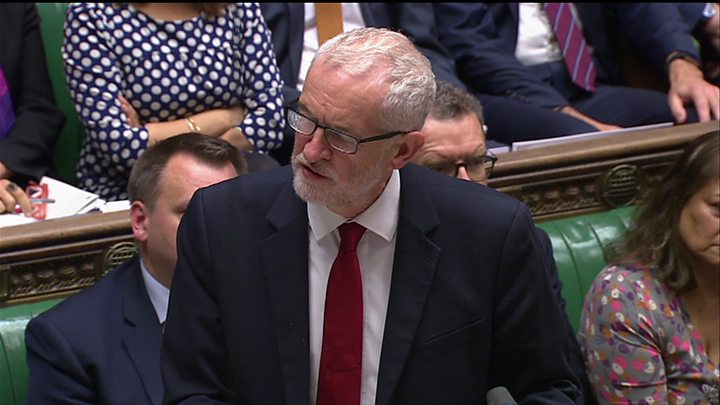
The PM will push for a general election if the EU proposes to delay Brexit until January, No 10 has indicated.
Boris Johnson “paused” his Brexit bill on Tuesday after MPs rejected his plan to get it signed off in three days.
Now EU leaders will consider whether to grant a delay to the 31 October Brexit deadline and what length it should be.
A letter Mr Johnson was forced by law to send to the bloc after failing to secure backing for his deal on Saturday calls for a three-month extension.
Justice Secretary Robert Buckland said it was “undeniably frustrating” to have lost the “programme motion” which would have given MPs three days to scrutinise the plans.
“We want to crack on. And if we can’t crack on, regrettably it does seem that a general election is the only way to sort this impasse out,” he told BBC Breakfast.
Mr Buckland said a no-deal Brexit was “still a real possibility” if the EU chose not to extend the deadline past 31 October.
Shadow justice secretary Richard Burgon told BBC Radio 4’s Today programme Labour would agree to a general election if the EU granted an extension because it meant a no-deal Brexit would certainly be “off the table”.
Mr Burgon said holding a referendum first – as suggested by some of his Labour colleagues – was “fantasy politics”.
- How soon could there be a general election?
- Listen to the latest Brexitcast
- How did your MP vote on the Brexit bill?
On Tuesday, MPs approved the prime minister’s Withdrawal Agreement Bill on its first hurdle through the Commons – called the second reading – by 329 votes to 299.
But minutes later Mr Johnson was defeated – by a majority of 14 – in a second vote on a fast-tracked timetable for the bill, prompting him to pause his legislation.
The prime minister insisted to MPs it was still his policy that the UK should leave the EU on Halloween, but acknowledged he would have wait to hear what EU leaders said.
Following the vote, EU Council President Donald Tusk said he would recommend European leaders backed an extension to the Brexit deadline, though he did not say what length it should be. He said he would “propose a written procedure”, thus negating the need for another summit meeting.
The BBC’s Europe editor Katya Adler said most of the people in EU circles she had spoken to were tempted to grant the extension to 31 January laid out in the so-called Benn Act – the law aimed at preventing no-deal.
Under that law, Mr Johnson wrote to the EU to ask for a three-month extension on Saturday, but did not sign the letter and said it was Parliament and not the government that had requested the delay.
However, BBC Brussels reporter Adam Fleming said an EU source had indicated the bloc was also considering a “flextension” – an extension with a maximum end date, but with the flexibility for the UK to leave early if a deal was ratified sooner.
‘Give it another go’
Former cabinet minister David Lidington said he expected the EU would grant an extension “to make sure that they don’t get the blame” in the event of a no-deal Brexit.
The Conservative MP told the Today programme the government should give the programme motion “another go” with an amended timetable, after asking the Labour Party how long its MPs needed to scrutinise the bill.
Mr Lidington said garnering support for an amended programme motion would reduce the chance of a general election, which would in part be favourable because: “I don’t think the public will welcome an election in the run-up to Christmas.”
Will the EU grant a new Brexit extension? If so, for how long?
The answer to these questions will most likely influence the next political events in the UK.
For example, if the EU refuses a new extension, MPs might well rush to approve the new Brexit deal, rather than face the possibility of no deal. The EU is hardly likely to run that risk though.
But if the bloc goes for a longer Brexit delay, then Boris Johnson will want to hold a general election (if parliament grants him one).
Read more from the BBC’s Europe editor.
‘Reasonable timetable’
Before Tuesday’s votes, Mr Johnson had threatened to pull the whole bill and call for a general election if the timetable motion was lost.
But the prime minister cannot force an election himself and would need the backing of Parliament.
Opposition MPs have previously ruled out holding a general election until the prospect of no-deal was off the table.
However, the BBC’s chief political correspondent, Vicki Young, said the Liberal Democrats would be likely to back an election if a three-month Brexit extension was agreed.
And BBC political correspondent Nick Eardley said SNP sources said they would also agree to a general election in this scenario.
Tory Brexiteer Andrew Bridgen said he thought the EU would grant such an extension.
Speaking on BBC’s Newsnight, he said if this happened there would be “no excuses” for Labour leader Jeremy Corbyn not to back an election.

Following Tuesday’s votes, Mr Corbyn said his party was prepared to work with the government to agree “a reasonable timetable” to enable the Commons to debate and scrutinise the Brexit legislation properly.
“That would be the sensible way forward, and that’s the offer I make on behalf of the opposition tonight,” he said.
His offer potentially opens the way for Parliament to approve the bill before the end of the year.
But it also opens up increased opportunities for MPs to seek to amend the legislation in ways the government would find unacceptable – such as by including a customs union or second referendum.
Stephen Kinnock, a Labour MP who supports Brexit but did not vote for Mr Johnson’s deal, told BBC Radio 4’s Today programme on Wednesday that the likelihood of the bill securing the support of MPs would increase if the government gave Parliament longer to scrutinise it and make amendments.
He said MPs and the government must “rediscover the lost art of compromise”.
For the prime minister – not that he would like to admit it – it is almost now impossible, even for an optimist like him, to imagine there is any remote possibility he will be able to stick to his Halloween deadline for Brexit to actually happen.
(There is one scenario where he could – if the EU turns down an extension – but that seems even less likely than Boris Johnson deciding he wants a quiet life, now the European Council President Donald Tusk said he would recommend another delay, even though we don’t know on what terms).
Political promises matter, especially one that was made repeatedly in such dramatic terms.
It is also true, however, that the prime minister achieved an important win on Tuesday night.
Read more from the BBC’s political editor.
What happens next?
If an election were to be triggered this week, the earliest it could take place would be Thursday 28 November, as the law requires 25 days between an election being called in Parliament and polling day.
MPs had been due to debate the bill over Wednesday and Thursday, but will now return to discussing the contents of the Queen’s Speech – which put forward the government’s domestic agenda for the new session of Parliament.
Confused about what just happened? Or what happens now? Submit your questions on the latest Brexit developments.
In some cases your question will be published, displaying your name and location as you provide it, unless you state otherwise. Your contact details will never be published. Please ensure you have read the terms and conditions.
Use this form to ask your question:
If you are reading this page and can’t see the form you will need to visit the mobile version of the BBC website to submit your question.
Brexit: PM to push for election if EU offers longer delay

